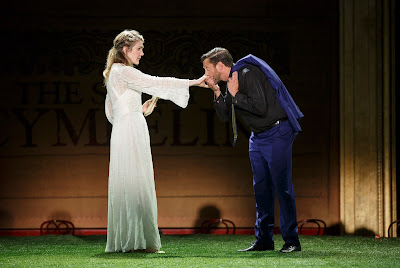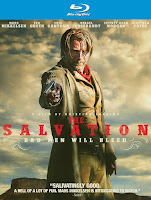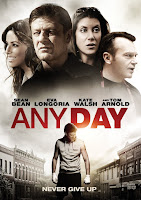- Details
-
Parent Category: Film and the Arts
-
Category: Reviews
-
Published on Wednesday, 12 August 2015 00:33
-
Written by Kevin Filipski
Barely Lethal
(Lionsgate)
This comic caper about a lethal assassin who, because she's a teenage girl, decides to become a "normal" high school kid, works on and off for 90 minutes, growing increasingly desperate to balance its Sixteen Candles homage with warmed-over Spy Kids-like action.
Kyle Newman's movie at least has Hailee Steinfeld, an accomplished and charming actress who holds the screen formidably since her memorable 2010 debut in True Grit: with the likes of Samuel Jackson and Jessica Alba wasted, Steinfeld is the only one worth watching. The movie looks good on Blu; extras comprise a commentary, deleted scenes and featurette.
(Alchemy)
In a faith-based drama with a twist even O. Henry would have rejected, a high school senior is framed for murder in 1950s Georgia and his identical twin brother takes matters into his own hands to set everything right. It's too bad hamfisted director Joshua Mills' inability to tell a straightforward story without obvious religious symbolism drags down his competent cast.
Some may find its message emotionally or spiritually satisfying, but it would have been more so without such heavyhanded writing and directing. The movie looks fine on Blu.
(CBS/Paramount)
This collaborative followup to The Bible by actress Roma Downey and husband Mark Burnett is an equally leaden and laugh-inducing mini-series, the opposite of Alice Hoffman's original novel about the events leading to the mass Jewish suicide at Masada around A.D. 73 through the eyes of several women.
This could have been gripping television, but if the visuals (well-chosen costumes, sets and locations) look OK, actresses Cote de Pablo, Rachel Brosnahan and Kathryn Prescott can do little, while someone like Sam Neill does even less. The superior hi-def transfer is the best thing about this release.
Far from the Madding Crowd
(Fox)
The latest adaptation of Thomas Hardy's novel about the free-spirited Bathesheba Everdene and the very different men she juggles has been directed crisply by Thomas Vinterberg and well acted by the always remarkably Carey Mulligan and, as her suitors, Tom Sturridge, Michael Sheen and Matthias Schoenaerts; too bad it loses out to John Schlesinger's longer 1967 film.
(Over)length is necessary, but Vinterberg's version clocks in at exactly two hours, making it more like Cliffs Notes. It looks gorgeous, of course, but there's a lack of sweep and grandeur amid the intimacy of Hardy's classic story. The Blu-ray transfer is excellent; extras comprise deleted scenes, an alternate ending and crew and cast interviews.
The French Lieutenant's Woman
(Criterion)
John Fowles' novel about an affair between a Victorian woman and a dashing man was long considered unfilmable, and the middling 1981 adaptation by director Karel Reisz, from a clever but unsatisfying script by Harold Pinter, does nothing to dispel that theory: by making the story a parallel affair between that couple and the contemporary movie stars portraying them, it crudely visualizes Fowles' intelligent conceit.
The Criterion Collection, of course, goes all out with its new Blu-ray edition: stunning hi-def transfer, new interviews with Meryl Streep and Jeremy Irons, and a South Bank Show episode from 1981 with vintage interviews of Reisz and Pinter.
(Warner Bros)
Anne Fletcher's mostly unfunny odd couple/buddy comedy, which stars Sofia Vergara and Reese Witherspoon as a hot tamale fugitive and tomboyish Southern cop on the run together (don't ask), might have been more palatable if the actresses had switched roles, but that would have forced the filmmakers to come up with something original and humorous.
Neither actress can overcome the sexist jokes thrown her way for 85 minutes; except for a decent opening title sequence, the movie is DOA. The hi-def transfer is solid; extras are featurettes and an alternate ending.
(Lionsgate)
For this Divergent follow-up, it's up to Shailene Woodley and her rockin' short haircut to save the world—or at least post-apocalyptic Chicago—from Jeanine (a bored-looking Kate Winslet), who wants all divergents hunted down. Woodley is terrific, as always, but even she finds it hard to keep a straight face when speaking many howlers in the dialogue or perform nonsensical stunts in several unexciting action sequences.
Whether director Robert Schwentke or Veronica Roth's original novel is to blame is immaterial, as we await the next installment of what's becoming another underwhelming dystopian young person's fantasy with trepidation. The movie looks very good on Blu; extras are a commentary and featurettes.
(Cinema Guild)
In Lisandro Alonso's western, a foreigner in late 1800s Patagonia looks for his teenage daughter a la The Searchers, but that cliched plotline is merely a pretext for Alonso's artful location camerawork and impressive editing, which partially compensate for the lackluster acting and script.
The claustrophobia induced by the square 1.33:1 frame provides tension, but Viggo Mortensen's hero has been directed so laconically that he literally fades into the background after awhile. The film has received a first-rate hi-def transfer; extras comprise a 30-minute New York Film Festival press conference and two Alonso shorts.
(Universal)
In his pleasant if uninspired directorial debut, Alan Rickman stars as the king of France in this fictional tale of the first female landscape designer (Kate Winslet) in a 17th century field dominated by men: Matthias Schoenaerts plays the head Versailles Gardens designer who has eyes for Winslet.
It's all very pretty (with enticing costumes and sets) but also pretty forgettable; Schoenaerts and Winslet are hamstrung by the middlebrow romance, Rickman's king is less droll than dull and Stanley Tucci's foppishness quickly turns enervating. The Blu-ray transfer is impeccable; surprisingly, there are no extras.
Flamenco Flamenco
(Music Box)
Legendary Spanish director Carlos Saura's brilliant career making music and dance films continues with this 2010 exploration of the indigenous Spanish art form, a follow-up to his own 1995 documentary, Flamenco; once again, stupendous performances of flamenco's greatest practitioners are superbly recorded by Saura and his frequent collaborator, the master cinematographer Vittorio Storaro.
Saura and Storaro's deftly (and intricately) choreographed camera movements create yet another intoxicating musical journey. Too bad that, on DVD, voluminous extras (short Saura interview, a look at the performers and a 100-minute making-of documentary) are included, which make the movie's transfer less than scintillating.
(IFC)
Stephen Belber, who adapted his own play, also directed this occasionally involving drama about an aging ballet dancer-teacher and his surprising relationship with a couple that's come to interview him.
Although the dialogue has bite and some wit, the machinations that trigger what happens to the trio are too contrived to take seriously, even if the intimate final scenes have a sort of tenderness to them that's likely due to the sensitive acting of Carla Gugino, the calm at the center of the overacted storm of Patrick Stewart and Matthew Lillard.
Person of Interest—Complete 4th Season
(Warner Bros)
Rookie Blue—5th Season, Volume 2
(e one)
The fourth season of Person finds the investigators as often as not being investigated themselves, all the while coming to terms with bleak ending of season 3; solid acting by Michael Emerson, Sarah Shahi, Jim Caviezel and the rest of the team is what propels the season's 22 fast-paced episodes.
In the first 11 involving episodes of Blue's 5th season, the men and women of the precinct try to deal with the physical and psychological aftereffects of two of their own being shot at last season's end.Person extras are featurettes, Comic-Con panel and gag reel; Rookie extras are a featurette and webisodes.
































